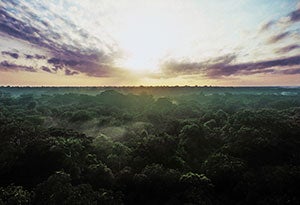How will climate change affect tropical forests?
International research team focuses on critical ecosystem
Mar 31, 2015 - by Staff
Mar 31, 2015 - by Staff
April 1, 2015 | Tropical forests play a major role in the planet’s carbon cycle, but there are a lot of uncertainties about how they will respond to climate change. A new international project aims to bring the future of tropical forests into much clearer focus.
The project, called the Next Generation Ecosystem Experiment–Tropics, or NGEE-Tropics, is led by the U.S. Department of Energy’s Lawrence Berkeley National Laboratory (Berkeley Lab). It includes scientists from the National Center for Atmospheric Research (NCAR).
The project will explore how tropical forests respond to increasing atmospheric carbon dioxide (CO2) levels, rising temperatures, shifting precipitation patterns, and other natural and human-induced changes.

A major new international project focuses on the potential impacts of climate change on tropical forests such as this one in Caxiuanã, Brazil. (Photo by Hugo Glendinning.)
Over the next decade, NGEE-Tropics scientists will collaborate with other researchers to carry out experiments in tropical forests around the globe. This research will fuel the development of a first-of-its-kind tropical forest ecosystem model that extends from the bedrock to the top of the forest canopy. The model will capture myriad soil and vegetation processes at a resolution better than 10 kilometers. This is the resolution that next-generation Earth system models will achieve during the project’s lifetime.
At NCAR, scientists will study the strategies that rainforest trees use to conserve water in order to better predict the response of different forest types to drought. This is because one particular concern for tropical biomes is their resilience to changing rainfall patterns. Separately, the NCAR team also will use data from large experimental burning projects in Brazil to refine a computer model that simulates the complex interactions between vegetation, fires and climate.
In both projects, the research team will work closely with community ecologists to better understand how different plant types are organized into ecosystems.
“NGEE is an unprecedented opportunity to bring the sciences of ecology and Earth system modeling together around a powerful set of experiments and observation campaigns to predict how ecosystems respond to changes in climate,” said NCAR scientist Rosie Fisher. “This is quite uncharted territory, and we're excited about what we might find."
In addition to NCAR, NGEE-Tropics brings together scientists from Brookhaven, Los Alamos, Oak Ridge, and Pacific Northwest national laboratories. It also includes researchers from NASA, the Smithsonian Tropical Research Institute, the U.S. Forest Service, and several institutions from other nations, including Brazil’s National Institute of Amazonian Research.
The 10-year, $100 million project is supported by the Department of Energy’s Office of Science.
For more about the project, see the Berkeley Lab news release.
Writer/contact
David Hosansky
Funder
U.S. Department of Energy
Collaborators
Lawrence Berkeley National Laboratory
Brookhaven National Laboratory
Los Alamos National Laboratory
Oak Ridge National Laboratory
Pacific Northwest National Laboratory
NCAR
NASA, the
Smithsonian Tropical Research Institute, the
U.S. Forest Service,
Brazil’s National Institute of Amazonian Research and several institutions from other nations
For the executive committee and scientific advisory board, see the NGEE-Tropics webpage.